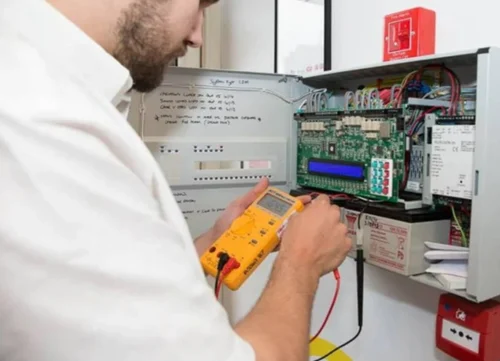Fire alarm systems are a critical component of any commercial building’s safety infrastructure. They provide early warning of potential fire hazards, allowing occupants to evacuate safely and timely. However, these systems are only as effective as their maintenance. This is where the British Standard BS 5839 comes into play.
BS 5839 is a comprehensive set of standards that provide guidance for the design, installation, commissioning, and maintenance of fire detection and alarm systems in buildings. It is divided into several parts, each addressing different aspects and types of premises.
For non-domestic premises, BS 5839-1:2017 is the relevant standard. It provides a code of practice for the design, installation, commissioning, and maintenance of systems in non-domestic premises.

Why Regular Maintenance is Crucial
Regular maintenance of fire alarm systems is crucial for several reasons:
- Ensuring functionality: Regular checks and maintenance ensure that all components of the system are working correctly. This includes detectors, sounders, control panels, and power supplies.
- Compliance with regulations: Regular maintenance is a requirement under BS 5839-1:2017. Failure to comply can result in penalties and could potentially invalidate insurance policies.
- Early detection of issues: Regular maintenance can help identify and rectify issues before they become major problems. This can save time, money, and potentially lives.
- Maintaining building safety: A well-maintained fire alarm system is essential for the safety of the building’s occupants. It provides early warning of fire, allowing for safe evacuation.
Pulsar Vertex’s Commitment
At Pulsar Vertex, we understand the importance of regular maintenance of fire alarm systems. We are committed to providing our clients with top-notch service that not only meets but exceeds the standards set out in BS 5839.
Our team of experts is well-versed in the requirements of BS 5839 and can provide comprehensive maintenance services to ensure your fire alarm system is always in optimal condition. We believe in proactive maintenance to prevent issues before they arise, ensuring the safety and peace of mind of our clients.
In conclusion, regular maintenance of fire alarm systems in commercial buildings is not just a regulatory requirement – it’s a crucial aspect of building safety. By adhering to the guidelines set out in BS 5839, businesses can ensure their premises are safe, compliant, and ready to respond in the event of a fire.
Maintenance Frequency
According to BS 5839, commercial fire alarm systems should be inspected at least every 6 months. For larger premises where more complex systems may be utilised, quarterly inspections are recommended. These inspections should be carried out by a competent fire safety professional.
Fire Alarm Testing Frequencies in the UK: Ensuring Safety and Compliance

Fire alarms play a critical role in safeguarding lives and property. In the United Kingdom, adhering to proper testing schedules is essential. Let’s break down the recommended frequencies for fire alarm testing:
- Weekly Testing:
- Frequency: Fire alarms should undergo weekly testing.
- Purpose: Regular tests ensure that the system functions correctly and promptly alerts occupants in case of a fire.
- Action: Designate a responsible person to activate at least one fire alarm call point each week. Rotate through different areas to cover the entire premises.
- Six-Monthly Inspections:
- Frequency: Legally, conduct six-monthly inspections annually.
- Purpose: These inspections assess the overall system’s condition, identifying any issues or maintenance requirements.
- Action: Engage a competent professional to perform a thorough inspection. Check components such as panel batteries, wiring, and connections to ensure optimal performance.
- Yearly Functional Test:
- Frequency: Annually, perform a functional test on every automatic fire detection device.
- Devices Included: This test covers automatic smoke detectors, heat detectors, optical beam detectors, and aspirating systems.
- Action: Verify that each device activates correctly and communicates with the fire alarm control panel.
Remember, adhering to these testing schedules is not only a legal requirement but also crucial for safety. Consult the relevant British Standard (BS 5839-1:2019) for comprehensive guidelines. Prioritize safety—because every alarm matters!

